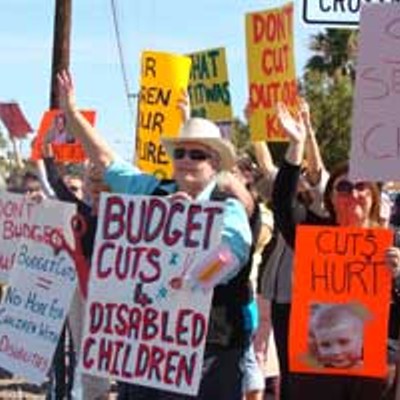Phipps gets $24,000 a year in scholarships, which pays for her two severely autistic sons' education and the therapies they receive at Father's Heart School in Tucson, a Christian school which she co-founded. After several years in the Tucson public-school system, Phipps says she and her husband realized their sons, now ages 6 and 7, were never going to get ahead unless they received more 1-on-1 instruction.
Before starting Father's Heart with another family of autistic children, Phipps says she unsuccessfully tried to find a program--whether in a public school or a private school--that could offer more 1-on-1 teaching. Without the scholarship dollars, Phipps says, she and other parents couldn't afford the tuition, which pays two specially trained teachers that work with about eight students.
"I don't blame anyone in the public schools," Phipps said. "They can only do what the district and state allows them to do, but it never helped my sons."
When her sons were in public schools, one was having meltdowns almost every day, she says, and personnel were not interested in learning why those meltdowns occurred. Phipps says her other son was being taught at a higher level than he was capable of understanding.
"He still didn't know his colors, numbers or alphabet," Phipps says.
With the 1-on-1 instruction her sons receive through Father's Heart, Phipps says, her children have improved over the last year. They talk more, understand basics like the alphabet and colors, and have better dispositions.
Despite the fact that children like Phipps' sons can excel in private settings, a state appellate court ruled in mid-May that the voucher program violates the Arizona Constitution.
The battle over vouchers used for private schools goes back to November 2006, when opponents filed a lawsuit to end the voucher program that the state started that same year. The lawsuit was defeated in January 2007, when a trial judge upheld the voucher system.
A month later, lawyers representing the American Civil Liberties Union of Arizona, the Arizona Education Association and People for the American Way filed a second lawsuit against the state voucher program, which distributes $5 million--$2.5 million to both disabled children and foster children.
A trial judge dismissed the lawsuit, but in a 3-0 ruling in mid-May, a Court of Appeals panel in Tucson reversed the dismissal, agreeing that vouchers for private schools violate the state Constitution.
This week, the state plans to go before the Arizona Supreme Court to begin an appeal process to keep the scholarships in place, which now serve 117 disabled children throughout the state, according to the state Department of Education.
Dan Pochoda, the ACLU of Arizona legal director, says the ACLU is happy with the May ruling. From an ACLU perspective, this is all about keeping public funds out of the hands of religious institutions: If private schools cannot meet the needs of disabled students, then funds need to be approved by public schools and doled out to private schools, he says.
Pochoda says he realizes there are students not properly served in public schools; however, the Legislature needs to address those issues with greater oversight regarding religious schools.
While the Phipps' school is Christian, not all private schools that serve disabled children are religious.
Cathy Curtin is counting on the scholarship to send her son to Desert Willow Educational Services, a nonreligious private school that works with children in specific areas where they are behind academically, such as reading and math.
Curtin, who has a 15-year-old autistic son, says she wrote a letter to Superintendent of Public Education Tom Horne asking that he and the state keep the scholarships in place while the state appeals.
The elementary school years went well for her son, Curtin says, but middle school was not as good, and his freshman year of high school was even worse.
In her June 4 letter to Horne, Curtin explained that her son's special-education teacher didn't have the skills needed to work with autistic children. Then there were the social problems.
"As these kids grow up, the social gap between them and their peers becomes wider. ... He has been subjected to teasing and bullying," Curtin wrote.
Curtin says she's given the public school system a fair chance, but autism often offers challenges that most public schools can't fully address.
"My daughter is a typical kid, and public school is just right for her. She shines in that setting, but that is not the case for all children, including my son," Curtin says. "I am aware the public schools are required to give every child a fair and appropriate education, but the reality is that it is not happening for all special-needs kids."
Tim Keller, a Tempe-based attorney representing the Phipps family and four other families, says religion has nothing to do with these vouchers. Keller works for Institute for Justice, what he describes as a Libertarian public-interest law firm that specializes in private-property, school-choice and free-speech issues.
Keller points out that the state Constitution says: "No tax shall be laid or appropriation of public money made in aid of any church or private or sectarian school, or any public service corporation." Keller claims the state funds allow parents to purchase education services from private schools, and don't aid churches and religious groups affiliated with private schools.
Keller's clients are concerned about fall tuition, because Horne--on the advice of Attorney General Terry Goddard--announced that all scholarships would cease until the Arizona Supreme Court issues a stay to allow the scholarships to resume.
But because the appellate court did not issue an injunction when it made its decision in mid-May, Keller says, the state doesn't need a stay to continue issuing scholarships.
"Obviously, we have a bit of a legal disagreement here with the AG's office, but the bottom line is that both Horne and parents will be going to court to try to keep the scholarships going for this upcoming school year," Keller says.











